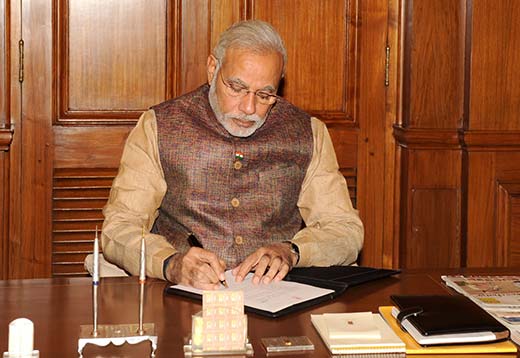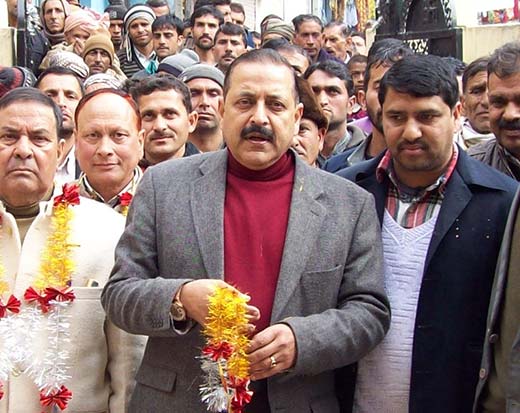Jitendra Singh’s statement regarding article 370 punctured high hopes of Kashmiris from Modi government. Shah Abbas talks to people across ideologies in J&K to get feelers about dashed hopes and high expectations

At a time when political circles and people of Kashmir were trying to search the brighter side of things, the MoS in PM’s Office Jitandra Singh Rana’s controversial statement on the Article 370 created a storm.
It seems, apart from its ‘special status’ J&K is different in many ways as even a single statement can stir political storms and change the entire discourse.
The political players and stakeholders in J&K had pinned their hopes on Modi Sarkaar, but Singh dropped a bomb shell disturbing everything. The statement of Singh even provided the ruling NC an issue to sell months before the scheduled state assembly elections.
“It is too early to develop any hopes on the new government, whose latest statement has disappointed not only National Conference but every Kashmiri,” Junaid Azim Matto, N C spokesman told Kashmir Life. Adding, “After a very good move by Modi to invite and talk to Nawaz, Singh’s statement is worrisome. NC is worried because the leaders like Rajnath Singh have also issued the same kind of statements in near past.”
The principal opposition, Peoples Democratic Party (PDP) is also very disappointed with the ‘discordant’ statement of Singh. “The way Modi started his innings surely gave rise to very high expectations but the discordant note of his Minister did a great damage,” PDP spokesman, Naeem Akhtar told Kashmir Life adding, “The beginning was good as he sat with the Pakistan Premier but Singh’s statement came in the way creating distaste.”
“We had many expectations with the new regime as it had promised to work on the Vajpayee’s formula of Insaaniyat and Jamhuriat but our optimism had to suffer with a set back by the statement of Jitandra Singh Rana,” a PDP lawmaker told Kashmir Life.
Apart from the separatists, all the two main regional political parties, National Conference and the People’s Democratic Party had expressed their optimism towards the Modi regime but the same stands affected by the statement of Jitandra Singh Rana.
The statement has gained significance only because Singh, known for his anti-Kashmir stance, is the only minister from J&K who has been deputed to the PM’s Office.
Earlier when Pakistan Prime Minister Nawaz Sharif accepted Modi’s invitation and participated in the oath taking ceremony of the visibly strongest Indian PM in last three decades, he broke a long tradition by not meeting the Kashmiri separatists in New Delhi.
“Nawaz probably did not want to annoy Modi who had always been critical of Pakistani government officials meeting separatists in New Delhi,” a political commentator said. Modi used to even oppose the New Delhi government as well for “allowing the anti-national elements to meet the enemy country’s representatives.”
Nawaz even did not mention the “K” word in his statement after meeting Modi. “For peace and security, we should bring stability instead of insecurity. I urge that we should not engage in accusations and counter-accusations. My government stands ready to discuss with India all issues in a spirit of cooperation,” he said.
So, Modi in his first master stroke not only hit the Kashmiri separatists but his main opposition, the Congress, as well. By Nawaz not meeting the separatists and not mentioning “Kashmir” in his statement, Modi passed a message to his political opponents, see where the difference between Modi and Manmohan is.
Even beaten by both Modi and Nawaz, Mirwaiz Umar Farooq is still hopeful that the new government in New Delhi will move forward to resolve the Kashmir issue.

“I hope once the new government in India settles down, resolution of Kashmir dispute will be its first priority,” Mirwaiz was quoted by a local English daily.
Mirwaiz leads the moderate faction of the separatist amalgam which held talks with former NDA and UPA governments within the ambit of the “Indian constitution”.
Peacenik, cleric is the only separatist who has expressed his hope on Modi.
Mohammad Yasin Malik, the chairman of the Jammu Kashmir Liberation Front who also held talks with the government of India is apprehensive about the Modi regime.
According to Malik, BJP and the personality of Narendra Modi and their long association with RSS is making the situation complicated. He said that after 1947, RSS has been asking Indian public to give them a powerful mandate so that they can implement their 3 point agenda which is eradication of Muslim personal law and enacting a common civil code, construction of Ram temple, and complete merger of Jammu Kashmir with Indian union against the wishes and aspirations of people of Jammu Kashmir.
“Now the question arises that will the new Indian government implement this dangerous agenda of RSS and set on fire the entire region (sub continent), or will it resist this agenda,” Malik reacted just after Modi got an absolute majority in the countries Lok Sabha elections.
The Hurriyat Conference faction led by old ailing Geelani, has not opened its cards, very unusual on its part. It has decided to adopt a “wait and watch policy”.
“It is too early to talk about any expectation with the new Indian dispensation,” Ayaz Akbar, the spokesman of the amalgam told Kashmir Life. “We are following a wait and watch policy for the time being,” he added.
But earlier, when Modi was yet to take oath of his office, Hurriyat (G) Chairman had said that Modi should accept the “injustices” done to the people of Kashmir.
“If justice will be done with Kashmiris, then it will really be an act of welfare for Indians and Asians. The whole South Asian region will enter into a new era of peace, stability and development,” Geelani had said.
Though BJP has a negligible presence in the valley, yet expectations have gone very high among the people after media reports about ‘Modi’s Gujrat’ model. But the state is facing polarization even on this subject.
“We have heard much about Modi’s Gujrat model but do not know the details, we expect a same type of investment here especially in the field of agriculture, the largest and most reliable industry,” Dr Ghulam Mohammad, a senior officer in the agriculture department said.
But, in Jammu where BJP has a strong base, common people and political circles expect Modi to “minimize the monopoly of the valleites” in Jammu and Kashmir. They allege that the regional parties like NC and PDP have remained “Kashmir centric” over the years resulting “in the massive loss to every aspect of their lives”.
“We have been neglected from a long time, but now we expect a bit of relief from the Modi Sarkaar,” Satish Rana, a medical representative by profession told Kashmir Life.
Negating Rana, a Kashmir University student alleged that people of Jammu want Modi to act on communal lines. “We have no expectations with a person who has been brought up in the lap of Sangh Parivar, and we feel that the communal elements will compel him to act in their favour, even though as the Prime Minister, he would not have any such intentions,” he said.
Away from the controversial statement of Singh and the expectations with the new dispensation, the Jammu and Kashmir is facing tremendous problems on the governing front because of the fact that it is facing shortage of funds. The state budget was passed earlier this year and it allotted funds for different schemes, projects and plans but the union budget is yet to be passed so the state like J&K which is said to be dependent on centre is facing on the financial front.
The worrying factor for the state government is that the new central dispensation has indicated that it is going to make some changes in the planning commission. A delegation of the commission is expected in Srinagar in the next month while as the state finance department is not in a position to finalise the things. Pertinently, the union budget is to be passed in the month of July.
However, planning and finance sources told Kashmir Life that they are receiving particular funds on monthly basis and there is nothing like fund scarcity so far. “All the departments have been receiving essential funds on monthly basis and we are sure that state will not face any problem on the financial front,” they said.

